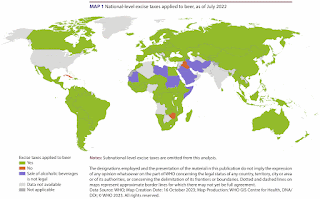Gott nytt år! Happy New Year. Bonne année. Frohes Neues Jahr. Feliz año nuevo. Buon Anno!
It has been noted recently that the World Health Organization (WHO) is currently running a campaign to eliminate alcohol consumption throughout the world (WHO shifts its alcohol narratives and the wine industry faces new challenges). As part of this concerted drive, this year the WHO released a Global Report on the Use of Alcohol Taxes. I will look briefly at one aspect of this document here: alcohol taxes.
The report notes:
Alcohol consumption is one of the leading risk factors for population health world-wide. While historically predominantly used to raise revenue, excise taxes are an effective tool to decrease the affordability of alcoholic beverages and reduce alcohol consumption and related harms. However, existing taxes on alcoholic beverages differ widely in terms of design and level, and most are not optimized to pursue health goals.Well, of course they are not! Taxes are principally designed to get money into government coffers, where it can be used for a multitude of things. Improved health may well be one of these things, but taxes are hardly optimized for this use.
Anyway, the report continues:
Amongst the different types of consumption taxes (including excise taxes, value added taxes, or VAT, sales taxes, and import duties), excise taxes are preferred from a public health perspective as they raise the relative price of alcoholic beverages compared to other products and services in the economy, helping reduce affordability.An excise tax is a legislated tax on specific goods or services at the time they are purchased (Excise tax: what it is and how it works). As such, an alcohol excise tax could be specifically arranged to financially address any ill-effects of alcohol on the community, if the government so decided. It is thus more specific than, say, a sales tax (which might apply to many different products).
However, this is all just theory. As WHO further notes, in practice:
As of July 2022, at least 148 countries have applied excise taxes to alcoholic beverages at the national level. However, wine is exempted from excise taxes in at least 22 countries, particularly those in the European Region. Excise taxes should apply to all alcoholic beverages.
Less than 25% of countries surveyed apply ad valorem excise taxes, with the majority of them (around 60%) applying them on the producer (manufacturer) price rather than on the retail price.
Out of the 148 countries that apply excise taxes to alcoholic beverages covered in this analysis, 21 earmark such revenue for various health programmes, including for universal health coverage, the prevention and control of non-communicable disease (NCD), alcohol control, and the promotion of physical activity.
WHO further notes:
Volume-based specific excise represents the most prevalent type of excise tax systems applied to beer and wine, while alcohol-content-based specific excise tax systems are the most prevalent for spirits.The countries involved in these different taxation strategies are shown in the three maps above (taken directly from the WHO report). However, in the case of wine, the WHO need not worry, because Global wine consumption has been declining for a long time, without any changes to the global set of tax systems.




No comments:
Post a Comment